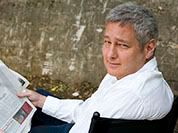True Lies: Bush's Philosophy of Truth and WMDs
Truths or Lies? Iraq Didn’t Shop for Nukes
The Bush Administration admitted last week its claim that Iraq was trying to buy uranium from Niger was based on forged documents.
The timing was unfortunate, because British Prime Minister Tony Blair has consistently refused to withdraw Britain’s charge that Saddam sought uranium for nuclear weapons in Africa. If the President and his men decided that they were going to give up trying to defend their phony nuclear weapons buying claim against Saddam, common courtesy dictated that the President should have called London and given the Prime Minister a ‘heads-up’ first.
For months the embattled Blair has been staving off accusations of incompetence or dishonesty in order to secure British participation in the war against Iraq. Now, thanks to the unilateral White House disclaimer, he looks like an even bigger ass than he did last week. The White House’s behavior was inexcusably rude; the very least the President should do is send some nice flowers and a “Gee, we’re sorry” card to 10 Downing Street.
But let’s get to the heart of the matter: how does any of this affect Stillwater? Here is how: the President may have been lying to you, the reader of this column, when he said that Iraq was seeking nuclear weapons. Weapons which could have been used here, against us. As unlikely as it may seem, Stillwater and its attractive, historic bridge would make a particularly inviting target to a madman like Saddam. Those of you who doubt this seem to have forgotten the lessons of September 11th.
But now it turns out that there were no weapons, and that the President may have lied about the degree of the threat to our community in order to get us to go to war. Clearly, the administration is worried about the damage done to its reputation for veracity. Though the White House now admits that the charge against Iraq was false, national security adviser Condoleeza Rice went on television to defend the use of this false statement by the President to justify our war against Iraq. She explained at length that this false charge was not inaccurate, just unproven by the United States.
But how is this possible? How could the President’s statements be both true and false, at the same time?
It is a simple matter for those of us who have studied philosophy. But I fear that most of you have not; the vast majority of Americans spend more time eating Cheetos and watching the Vikings blow it in the playoffs than they do perusing the works of Wittgenstein and Lord Russell.
And it is your loss; because when the President makes a bunch of conflicting statements all in a row, you won’t understand him and will think that he is ‘lying’. And this is not fair: for philosophers tell us that words (and the meanings individuals attribute to words) form our ideas and thus form our minds. This is why it is perfectly consistent for the President to assert that his statement about Iraq trying to buy materials for a nuclear bomb was accurate, and later acknowledge that it was at the same time false.
For example, I may make a statement: “Your wife is fat.” The statement may be true or false, that is, either accurate or inaccurate. There are several unknown factors that affect the truth or accuracy of the statement (e.g. is she from Wisconsin?). But it is also possible that the statement “your wife is fat” was accurate when it was made, but later proves to be false. Or the other way around. And this is why the President left that particular statement out of his speech.
He was not so fortunate with his ‘accurate but false’ statement about Iraq trying to buy material for nuclear weapons. But we must remember that when the President was once asked to name his favorite philosopher, he did not answer “Bertrand Russell” or “Jacques Derrida”, but “Jesus Christ”.
And He alone knows what the President is talking about when he tries to explain this.



0 Comments:
Post a Comment
<< Home